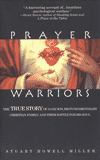Tony
Heyes Reviews the Sometimes Maddening, Sometimes Profound
Prayer Warriors | ||
 Prayer Warriors By Stuart Howell Miller Consortium Books May 1999 Softcover, 304 pages ISBN 1555834450 Readers will be familiar with Ron Donaghe’s The Salvation Mongers, a dramatic, highly charged account of a group of Christian zealots intent on straightening out a group of gay men. By playing on the guilt about being gay instilled in these men from an early age, the zealots seek to convince them that gayness is a matter of choice, a wilful turning away from God and that all they have to do to be “saved” is choose differently. If, as I did when I first read it, you think that the picture he draws is a tad exaggerated, think again. It isn’t. Stuart Howell Miller’s Prayer Warriors is an autobiographical account of being brought up in a family similar to the ones described in The Salvation Mongers. Miller grew up as a self-styled sissy, uninterested in games and mechanical things. He describes growing up in a family with a father who, following a religious conversion, saw himself as a divinely authorised moral policeman. Prayers and bible-reading played a large part in | family
life and Miller Sr. seems to have taken very seriously his role of
domestic
dictator, going far beyond what an ordinary father would consider
normal
in seeking to regulate his children’s lives. He regarded his
son as
“garbage”,
telling him that were he not his father he was not someone he would
choose
as a friend. Eventually Miller left home and began to live an actively gay life. Although he had given his family plenty of hints about his sexual orientation, they had chosen to ignore it. At age 26, by now comfortable with his sexuality and his life, he felt he wanted to be honest with his family and returned to Nashville, Tennessee, to share his big secret with them. The result was as one would have expected. Pleased that Miller had “confessed” to them, his father then proceeded to say it was a problem that they were going to solve with God’s help. Although initially his siblings were sympathetic to his situation, they eventually joined their parents in condemning their brother. What followed was horrendous. Miller’s parents gave his name and address to their like-minded friends who bombarded him with letters pointing out that homosexuality is the “abomination” spoken of in the bible (it isn’t) and promising to pray for him. There followed a stream of letters from all and sundry. The family acrimony even spilled over onto the Internet | where
letters of condemnation by his sister could be read. Truly these people
are
salvation mongers (“monger: since 16th c., chiefly, one who
carries on
a
petty or disreputable traffic”. O.E.D.) At this point in the
story the
reader’s
sympathies are fully engaged. Such a rejection, followed by such
wholesale
condemnation, patronising “concern” and invasions
of privacy would cow
anyone. By the end of the account, however, exasperation sets in. Miller still feels that the good opinion of people, whom he himself despises by then, is worth having. He seems to feel that they can be bludgeoned by argument into loving him. He shows himself every bit as unbending as his father, insisting on the rightness of his position and the wrongness of theirs – dogma opposing dogma. Both sides, feeding on one another’s opposition, forget that life is a messy business, not neat and tidy and responsive to syllogistic reasoning. To be loved you have to be loveable. Miller closes his book fighting, as it were, for peace, crusading against all those who take his parents’ line. Sometimes this requires a superhuman effort: sometimes others don’t recognise loveableness when they see it. Philip Larkin put it best in his poem This Be the Verse. We are our parents’ children and they, as much as we, need to realise that. We can no more blame them for being what they are than they can blame us, for “they were fucked up in their turn”. |
| Home • Issue #5 Front Page • Newsletter Archives • Article Archives |